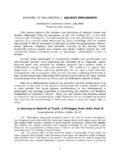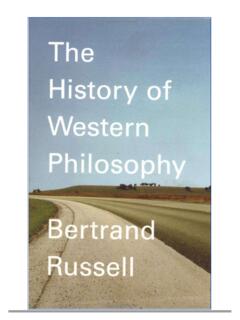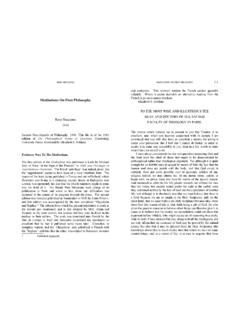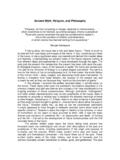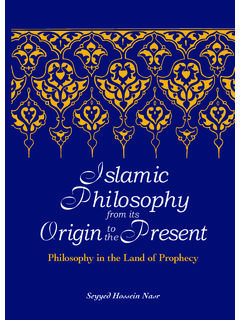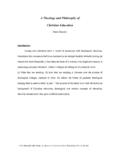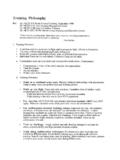Transcription of A History of Western Philosophy - Μουσική
1 A History of Western Philosophy Ralph McInerny Volume I Foreword / Acknowledgements Part I: Presocratic Philosophy o Chapter I: Before Philosophy A. The Quarrel Between Philosophy and Poetry B. The Theological Poets C. Greek Primitive Religion o Chapter II: The Ionians A. Thales of Miletus B. Anaximander of Miletus C. Anaximenes of Miletus D. Xenophanes E. Heraclitus of Ephesus o Chapter III: The Italians A. The Pythagoreans 1) Pythagoras of Samos 2) Pythagorean Doctrines B. Parmenides of Elea C. Zeno of Elea D. Melissus of Samos o Chapter IV: Empedocles of Acragas A.
2 On Nature B. Purifications o Chapter V: Anaxagoras of Clazimenae o Chapter VI: Atomism Diogenes of Apollonia o Chapter VII: The Sophists A. Protagoras of Abdera B. Gorgias of Leontini C. Prodicus of Ceos D. Some Other Sophists E. Concluding Summary Part II: The Classical Period o Chapter I: Socrates A. His Life B. The Character of Socrates C. The Doctrine of Socrates D. The Socratic Schools o Chapter II: Plato A. The Man and His Work B. The Doctrine of Forms C. The Crisis in Plato's Thought D. Plato's Natural Doctrine E. Plato's View of Man o Chapter III: Aristotle A.
3 The Man and his Work B. The Nature and Division of Philosophy C. Aristotle's Logic D. Aristotle's Philosophy of Nature E. Moral and Political Philosophy F. First Philosophy Part III: The Hellenistic Period o Chapter I: Epicureanism A. Canonic B. Physics C. Ethics D. The History of the School o Chapter II: The Stoics A. Logic B. Physics C. Ethics D. The Roman Stoics o Chapter III: Sceptics and the New Academy A. Pyrrho of Elis B. Timon of Philus C. Arcesilaus D. Carneades of Cyrene E. Some Later Sceptics F. The Subsequent History of the Academy o Chapter IV: Neoplatonism A.
4 Revival of Pythagoreanism. B. Plotinus C. After Plotinus Bibliography o Readings for Part One A. Sources B. General Studies C. Particular Studies o Readings for Part Two A. Sources and Studies: Plato B. Sources and Studies: Aristotle o Readings for Part Three Index to Volume I Volume II Part I: The Age of Augustine o Chapter I: Faith and Philosophy o Chapter II: Saint Augustine A. The Man and His Work B. Philosophy and the Arts C. Philosophy and Beatitude D. Criticism of Platonism E. What Is Man? F. G o d G. Creation H. The City of God I. Conclusion o Chapter III: Denis the Areopagite o Chapter IV: Boethius A.
5 The Man and His Work B. Faith and Reason C. Division of Philosophy D. The Status of Universals F. Plato or Aristotle? F. C o n c l u s i o n o Chapter V: Cassiodorus, Isadore, Bede Part II: The Carolingian Renaissance o Chapter I: Alcuin and Rhabanus Maurus A. Charlemagne and the Schools B. Alcuin (735-804) C. Fredegisus of Tours D. Rhabanus Maurus (784-856) E. The Carolingian Heritage o Chapter II: John Scotus Erigena A. His Life and Works B. Faith and Philosophy C. The Division of Nature o Chapter III: Other Ninth and Tenth Century Figures A. Heiric of Auxerre ( - ) B.
6 Remigius of Auxerre ( - ) C. Gerbert of Aurillac ( ) Part III: The Twelfth Century o Chapter I: Introduction o Chapter II: Saint Anselm of Canterbury A. The Man and His Work B. Faith and Reason C. The Proof of God's Existence D. Anselm and Dialectics o Chapter III: Peter Abelard A. The Man and His Work B. Abelard's Logic C. Faith and Reason D. Abelard's Ethics o Chapter IV: The School of Chartres A. From Fulbert to Bernard B. Gilbert of Poitiers (1076-1154) C. William of Conches ( - ) D. Thierry of Chartres (died before 1155) E. Clarenbald of Arras (died ) F. John of Salisbury (1110-1180) o Chapter V: Monastic Thought A.
7 Hugh of St. Victor (1096-1141) B. Other Victorines C. Bernard of Clairvaux (1090-1153) D. Other Figures o Chapter VI: Dominicus Gundissilinus A. What Is Philosophy ? B. The Division of Philosophy Part IV: The Thirteenth Century o Chapter I: The Background A. The Universities B. Translations C. Islamic Philosophy o Chapter II: The Beginnings A. William of Auvergne ( ) B. Alexander of Hales ( ) C. Robert Grosseteste (1175-1253) o Chapter III: Albert the Great A. The Man and His Work B. Faith and Reason C. Conclusion o Chapter IV: Roger Bacon A. His Life and Work B. The Opus majus C.
8 Conclusion o Chapter V: Saint Bonaventure A. The Man and His Work B. The Nature of Philosophy C. Simultaneity of Knowledge and Belief D. Is Philosophy Autonomous? E. The Division of Philosophy F. The Divine Ideas C. The Nature of Illumination H. Proofs of God's Existence I. Creation and Universal Hylomorphism J. Conclusion o Chapter VI: Saint Thomas Aquinas A. The Man and His Work B. Philosophy and Theology C. The Division of Philosophy D. Log ic E. Natural Philosophy F. M e t a p hy s i c s G. Moral Philosophy H. Thomas and His Time o Chapter VII: Conclusion Part V: The Fourteenth Century o Chapter I: Introduction o Chapter II: John Duns Scotus A.
9 The Man and His Work B. Being and God C. Faith and Reason o Chapter III: William of Ockham A. The Man and His Work B. Knowledge C. Logic D. Metaphysics Index to Volume II Foreword This History of ancient Philosophy tries to give a comprehensive but wholly introductory sketch of a difficult and changing historical terrain. We are still learning about the beginnings of Philosophy and the scholarly contributions to our knowledge mount almost menacingly, intimidating one who would attempt an over-all simplified presentation. Writing a memo in anticipation of the Libyan battles, Churchill predicted that renown awaited the commander who would restore artillery to its proper place on the battle field: later he seemed as pleased with his phrasing of the claim as of its fulfillment.
10 Perhaps a relieved welcome, if not renown, awaits an introductory History which is not studded with the artillery of footnotes apprising the bewildered neophyte of esoteric studies on the fine points of recent scholarship in the period he is encountering for the first time. It is my feeling that there is little point in cluttering an introductory work with such references: the teacher does not need them and the student is not ready for them. Better unabashedly to popularize the period so as to make it as immediately and painlessly accesible as can honestly be done. The short reading lists at the back of the book will enable the interested reader to begin study in that scholarship on which such books as this are based.




